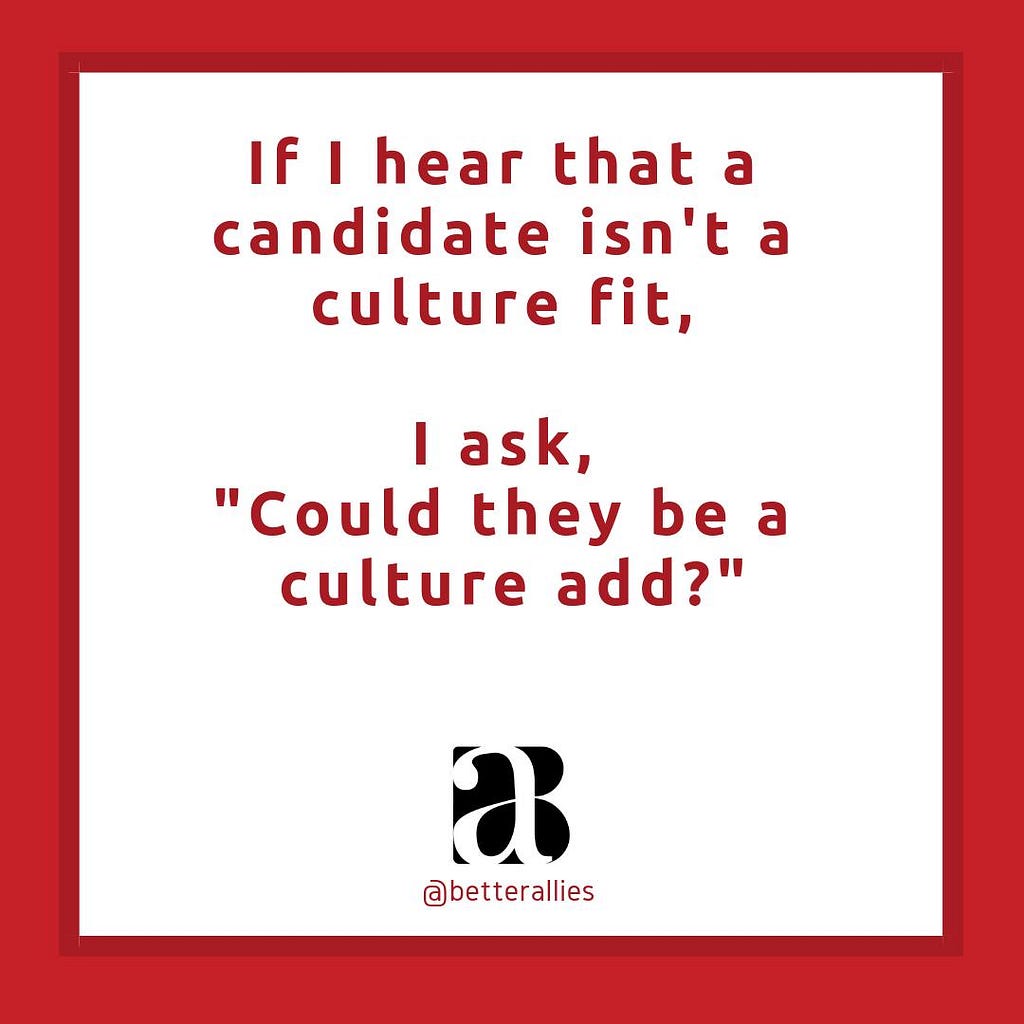Latest news about Bitcoin and all cryptocurrencies. Your daily crypto news habit.
 Graphic with words, “If I hear that a candidate isn’t a culture fit, I ask, Could they be a culture add?”
Graphic with words, “If I hear that a candidate isn’t a culture fit, I ask, Could they be a culture add?”1. Make “culture add” the new “culture fit”
Let’s think about culture fit, and the age-old interview debrief question of, “Would you want to grab a beer with them?”
Back in the 1980s, culture fit and “chemistry” were all the rage. They sprang from the idea that if companies hired employees whose personalities and values aligned with organizational strategy, those employees would feel more invested in their jobs and become more loyal. Skills were important, but cultivating a workforce of like-minded people ran a close second.
Over time, however, “culture fit” became code for something else: passing the friendship test. The whole “grab a beer” scenario prompted decision-makers to begin thinking of “culture fit” as relating to likeability, personal similarities, and chemistry with the interviewer. It gave them license to hire people they wanted to hang out with, and pass over people who might’ve been ideal for the job but clashed with their leadership styles. Read more about culture fit here.
To combat this homogeneous mindset, try the following. The next time you’re in an interview debrief meeting and hear someone say that the candidate isn’t a culture fit, chime in with, “Could they be a culture add?”
2. Host a Better Allies “video book club”
Gowri Grewal, Senior Director of Field Engineering at Twilio, recently held a “video book club” discussion about Better Allies. Ahead of time, she asked her colleagues to watch this video of our founder, Karen Catlin, speaking at Amazon’s AWS Re:Invent conference, and encouraged them to each identify three takeaways from the talk. They then met to discuss their takeaways and brainstorm ideas for creating a more inclusive culture.
Diversity and inclusion is clearly important to Twilio. By 2023, the company wants 50% of its workforce to be female and 30% to either be black or Latino, identify as two or more races, be Pacific Islander or Native American, LGBTQ, or any combination thereof. (Read more about their diversity goals here).
If you’re also focused on increasing the diversity of your workplace, consider hosting a Better Allies “video book club” discussion for your team. Or invite Karen to speak at your next event. Send us an email to ask about next steps.
3. Embrace “micro-sponsorship”
When you see that someone has done good work, no matter how small, do you highlight it to the people that matter? Doing so is an act of micro-sponsorship, and it can make a big difference. See this inspiring Twitter thread for an example.
Lori Nishiura Mackenzie and Caroline Simard of Stanford’s Clayman Institute for Gender Research shared loads of other ideas for micro-sponsorship in this article, including:
- Affirm a person’s competency. For example, acknowledge a woman leader’s key contribution to her peers in a meeting or public forum.
- In team meetings, notice when women’s contributions are overlooked. When someone else gets credit for her idea, add a comment such as “I’m glad you picked up on X’s idea” to bring back the credit to her.
- In discussions of talent, ask clarifying questions when you suspect bias. Ask, for example, “What do we mean, exactly, when we say she is not strategic? How are we applying this criteria across all candidates?” or “you say she is aggressive, yet I don’t see her exhibiting different communication behaviors than her colleagues.”
- When you hear others discuss big assignments, bring up the name of top female talent as potential candidates.
Why not set a personal goal to make an act of micro-sponsorship every day, especially for people from marginalized groups?
4. Don’t avoid colleagues of a different gender
Journalist and author Nicholas Kristof wrote an opinion piece in the New York Times, Navigating the Male-Female Work Relationship. We especially love his subtitle, “There’s plenty of safe middle ground between a man’s leering at women and his simply avoiding them.” And he goes on to share personal experiences of how he navigated this middle ground.
If you find yourself avoiding spending time with colleagues of a different gender than yourself, consider Nicolas’ words of caution: “The upshot is that managers who don’t mentor women don’t just hurt those women; they also sell their own companies short.”
5. Use “spouse” instead of “husband” or “wife”
On Valentine’s Day in the US, a bill was introduced to remove gender-specific references such as “husband” and “wife” from the US tax code, and to use “spouse” instead. It’s an effort to be more LGBTQ-inclusive. ❤️
Being an ally is a journey. Want to join us?
- 😍 Follow @betterallies on Twitter, Medium, Instagram, or Pinterest.
- ✉️ This content originally appeared in our newsletter, 5 Ally Actions. Subscribe to get it delivered to your inbox every Friday.
- 📖 Read the Better Allies book.
- 👕 Get your Better Allies gear
Together, we can — and will — make a difference.
Make “Culture Add” the New “Culture Fit,” and Other Actions for Allies was originally published in Hacker Noon on Medium, where people are continuing the conversation by highlighting and responding to this story.
Disclaimer
The views and opinions expressed in this article are solely those of the authors and do not reflect the views of Bitcoin Insider. Every investment and trading move involves risk - this is especially true for cryptocurrencies given their volatility. We strongly advise our readers to conduct their own research when making a decision.